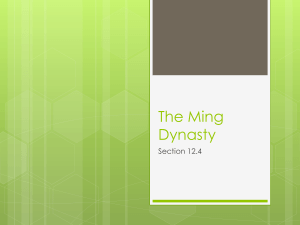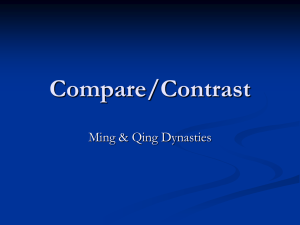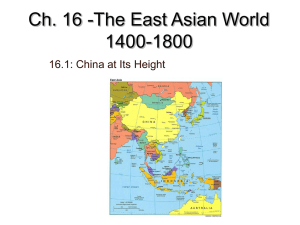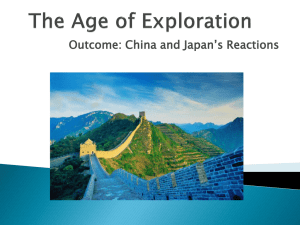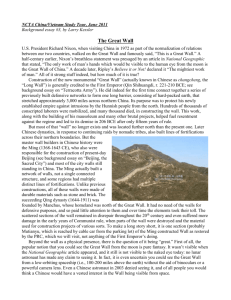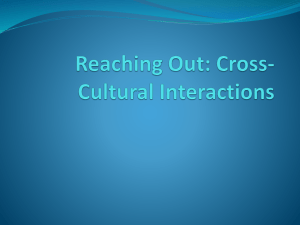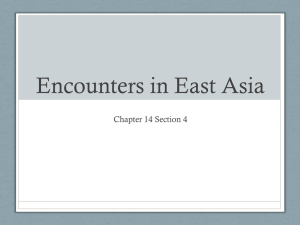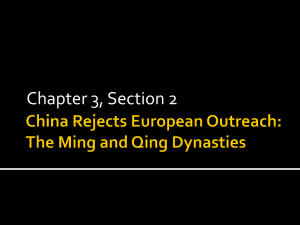hist_490_syllabus_2014
advertisement
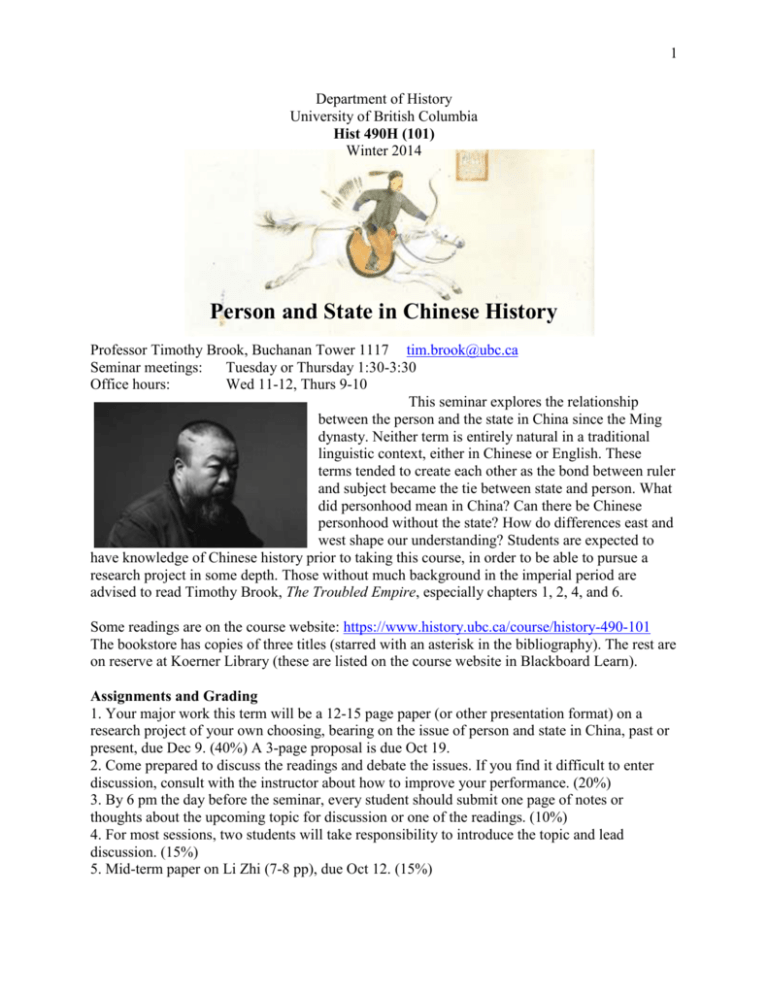
1 Department of History University of British Columbia Hist 490H (101) Winter 2014 Person and State in Chinese History Professor Timothy Brook, Buchanan Tower 1117 tim.brook@ubc.ca Seminar meetings: Tuesday or Thursday 1:30-3:30 Office hours: Wed 11-12, Thurs 9-10 This seminar explores the relationship between the person and the state in China since the Ming dynasty. Neither term is entirely natural in a traditional linguistic context, either in Chinese or English. These terms tended to create each other as the bond between ruler and subject became the tie between state and person. What did personhood mean in China? Can there be Chinese personhood without the state? How do differences east and west shape our understanding? Students are expected to have knowledge of Chinese history prior to taking this course, in order to be able to pursue a research project in some depth. Those without much background in the imperial period are advised to read Timothy Brook, The Troubled Empire, especially chapters 1, 2, 4, and 6. Some readings are on the course website: https://www.history.ubc.ca/course/history-490-101 The bookstore has copies of three titles (starred with an asterisk in the bibliography). The rest are on reserve at Koerner Library (these are listed on the course website in Blackboard Learn). Assignments and Grading 1. Your major work this term will be a 12-15 page paper (or other presentation format) on a research project of your own choosing, bearing on the issue of person and state in China, past or present, due Dec 9. (40%) A 3-page proposal is due Oct 19. 2. Come prepared to discuss the readings and debate the issues. If you find it difficult to enter discussion, consult with the instructor about how to improve your performance. (20%) 3. By 6 pm the day before the seminar, every student should submit one page of notes or thoughts about the upcoming topic for discussion or one of the readings. (10%) 4. For most sessions, two students will take responsibility to introduce the topic and lead discussion. (15%) 5. Mid-term paper on Li Zhi (7-8 pp), due Oct 12. (15%) 2 Part 1. First-Order Questions Week 1. Sept 4/9. How to think about the person and the state The opening meeting will be to think about the basic concepts and questions of our inquiry. Alison Klayman, Never Sorry (2012) Part 2. Person and state in imperial China Week 2. Sept 11/16. Person and state in Ming property law The possession of property is sometimes regarded as an indicator of legal personhood. Does this apply to property-holding in the Ming? What was the status of property and person who owned it? Timothy Brook, “A Grave in Nanchang,” in The Chinese State in Ming Society, 1-14 Jiang Yonglin, The Ming Code, 76-82 Week 3. Sept 18/23. Person and state in Ming criminal law The Ming Code is the basic set of imperial laws. How does the person appear in the Code? What limits did imperial law place on the person? Is somatic integrity essential to personhood? Jiang Yonglin, The Ming Code, 18-22, 34-35 Timothy Brook et al., Death by a Thousand Cuts, chs. 2, 4 Week 4. Sept 25/30. Person and state in a religious context What was a Buddhist or Daoist a “person” in the Ming? Did moral life and salvation define personhood? Could religious consciousness precede real-world existence? William Pietz, “Person” Timothy Brook et al., Death by a Thousand Cuts, ch. 5 Kenneth Dean, “Ritual and Space: Civil Society or Popular Religion?” Week 5/6. Oct 7/9. Mid-term written assignment Drawing principally on the writings of Li Zhi (1527-1601) posted on the Li Zhi project website at the University of Chicago, write a an essay of 7-8 pages inquiring into what ideas Li Zhi might have had with regard to person and state. Theodore de Bary, Self and Society in Ming Thought, 145-57, 188-225 Ray Huang, 1587, a Year of No Significance, chapter on Li Zhi The class will not meet on these dates. The paper is due on Oct 12. Part 3. Second-Order Questions Week 5/6. Oct 2/14. Comparative law and the legal person How does the European context for the concepts of person and state affect our analyses of China? Lucien Pye and Teemu Ruskola offer strikingly different views. Lucien Pye, “The State and the Individual” Teemu Ruskola, Legal Orientalism, 1-59 Part 4. Person and state under the Republic Week 7. Oct 16/21. The female person under empire and republic Ming law made distinctions based on gender: women occupied a different status than men. What was female personhood under imperial law? The “women’s question” surfaced as an early concern of intellectual reformers in the Republic. How did female personhood change? Jiang Yonglin, The Ming Code, pp. 29, 40, 82-90, 240 3 Janet Theiss, Disgraceful Matters, pt. 4: “Being a ‘Person’,” 167-91 Peter Zarrow, After Empire, chs. 1-2 Liang Qichao, “On Women’s Education” Ming Hui, “Women’s Right to Vote” Kathryn Bernhardt, “Women and the Law: Divorce in the Republican Period.” Week 8. Oct 23/28. The emergence of a Chinese human rights discourse Intellectual currents preceding the collapse of the imperial system brought to China new ways of imagining the person and the state. One of the powerful new ideas was human rights. Peter Zarrow, After Empire, chs. 3, 8, Conclusion Marina Svensson, Debating Human Rights in China, chs. 2, 5-7 -----, Chinese Human Rights Reader: documents #1-5, 7 Week 9. Oct. 30/Nov 4. Constitutionalizing person and state Republican and Communist regimes alike embraced the notion that rights should be written down in a constitution that governed the duties of citizens and obligations of the state. Jérôme Bourgon, “Rights, Freedoms, and Customs in the Making of Chinese Civil Law” Marina Svensson, Chinese Human Rights Reader: documents #12, 21, 24, 25 Andrew Nathan, chapter on constitutions in Human Rights in Contemporary China Part 5. Person and state under the People’s Republic Week 10. Nov 6/11. Peasants in a Leninist system Peasants had their own peculiar status in the Maoist system. Was peasant personhood something different that what urban Chinese experienced? Jeremy Brown, “Spatial Profiling: Seeing Urban and Rural in Mao’s China” -----, City versus Countryside in Mao’s China, 137-68 (ch. 6) -----, “Moving Targets: Changing Class Labels in Rural Hebei and Henan, 1960-1979” Gail Hershatter, Gender of Memory, 210-35 Week 11. Nov 13/18. Intellectuals in a Leninist system What did the imposition of a Leninist political system mean for the issue of person and state for intellectuals? The choice has generally been the stark one of service or withdrawal, and not all intellectuals have been happy with that choice. Mao Zedong, “Yan’an Talks on Art and Literature” (extracts) Wang Shiwei, “Politicans, Artists” Timothy Cheek, “Rejuvenation: Organizing China (1936-1956)” Week 12. Nov 20/25. Persons today To explore person and state today, we will read a few essays by the novelist Yu Hua, plus a short manifesto by Nobel laureate Liu Xiaobo. We will also revisit Ruskola. Yu Hua, “People” and “Leader,” in China in Ten Words Liu Xiaobo, “On Living with Dignity in China,” in his No Enemies, No Hatred, 128-30 Teemu Ruskola, Legal Orientalism, ch. 6 Week 13. Dec 2 (joint session). Student presentations 4 Course and reference bibliography Bernhardt, Kathryn. “Women and the Law: Divorce in the Republican Period.” In Civil Law in Qing and Republican China, ed. Kathryn Bernhardt and Philip Huang, 187-214. Stanford: Stanford University Press, 1994. KNN1572 C58 Bourgon, Jérôme. “Rights, Freedoms, and Customs in the Making of Chinese Civil Law, 19001936.” In Realms of Freedom in Modern China, ed. William Kirby. Stanford: Stanford University Press, 2004. JC599 C6 R43 Brook, Timothy. The Chinese State in Ming Society. Abingdon: RoutledgeCurzon, 2005. -----. Quelling the People: The Military Suppression of the Beijing Democracy Movement. Oxford: Oxford University Press, 1992; Stanford: Stanford University Press, 1998. -----, and B. Michael Frolic, eds. Civil Society in China. Armonk NY: M.E. Sharpe, 1997. *-----; Jérôme Bourgon; and Gregory Blue. Death by a Thousand Cuts. Cambridge, Mass.: Harvard University Press, 2008. Brown, Jeremy. City versus Countryside in Mao’s China: Negotiating the Divide. New York: Cambridge University Press, 2012. On-line @ UBC Library -----. “Moving Targets: Changing Class Labels in Rural Hebei and Henan, 1960-1979.” In Maoism at the Grassroots: Everyday Life in China’s Era of High Socialism, ed. Jeremy Brown and Matthew D. Johnson. Cambridge, MA: Harvard University Press, forthcoming. -----. “Spatial Profiling: Seeing Rural and Urban in Mao’s China.” In Visualizing China: Image, History and Memory in China, 1750-Present, ed. James Cook, Joshua Goldstein, Matthew D. Johnson, and Sigrid Schmalzer. Lexington Books, forthcoming. Cheek, Timothy. The Intellectual in Modern Chinese History. Forthcoming. de Bary, W. Theodore. “Individualism and Humanitarianism in Late Ming Thought.” In Self and Society in Ming Thought, ed. Theodore de Bary, 145-248. New York: Columbia University Press, 1970. DS721 S39; on-line @ UBC Library Dean, Kenneth. “Ritual and Space: Civil Society or Popular Religion?” In Civil Society in China, ed. Timothy Brook and B. Micaehl Frolic, 172-92. Armonk NY: M.E. Sharpe, 1997. Edwards, R. Randle; Louis Henkin; and Andrew Nathan. Human Rights in Contemporary China. New York: Columbia University Press, 1986. JC599 C6 E39 Hershatter, Gail. Gender of Memory: Rural Women and China’s Collective Past. Berkeley: University of California Press, 2011. HQ1769.S433 H47; on-line @ UBC Library 5 Huang, Ray. 1587, a Year of No Significance. New Haven: Yale University Press, 1981. DS753 H798 Y34 Chinese translation: Huang Renyu, Wanli shiwunian. DS753 H79812 Jiang, Yonglin, trans. The Ming Code. Seattle: University of Washington Press, 2005. Kuo, Margaret. Intolerable Cruelty: Marriage, Law and Society in Early Twentieth Century China. Lanham: Rowman & Littlefield, 2012. Liang Qichao. “On Women’s Education.” In The Birth of Chinese Feminism: Essential Texts in Transnational Theory, ed. Lydia Liu et al., 189-203. New York: Columbia University Press, 2013. HQ1767 B57 Liu, Lydia. Clash of Empires: The Invention of China in Modern World Making. Cambridge, Mass.: Harvard University Press, 2006. Liu Xiaobo. No Enemies, No Hatred: Selected Essays and Poems. Cambridge, Mass.: Harvard University Press, 2012. PL2879 X52 A2; on-line @ UBC Library Ming Hui. “Women’s Right to Vote.” In Women in Republican China, ed. Hua R. Lan and Vanessa Fong, 206-207.Armonk, NY: M.E. Sharpe, 1999. HQ1737 W67 Pietz, William. “Person.” In Critical Terms for the Study of Buddhism, ed. Donald Lopez, pp.188-210. Chicago: University of Chicago Press, 2005. Pye, Lucien. “The State and the Individual: An Overview Interpretation.” In The Individual and the State in China, ed. Brian Hook, 16-42. Oxford: Oxford University Press, 1996. JC599 C6 I53 Ruskola, Teemu. “Legal Orientalism.” Michigan Law Review 101:1 (Oct 2002), 179-234. -----. Legal Orientalism: China, the United States, and Modern Law. Cambridge, Mass.: Harvard University Press, 2013. K237 R87; on-line @ UBC Library Svensson, Marina. The Chinese Conception of Human Rights. Lund University, 1996. Also published as Debating Human Rights in China (Rowman & Littlefield, 2002). JC599 C6 S94 -----. Chinese Human Rights Reader: Documents and Commentary, 1900-2000. Armonk, NY: M.E. Sharpe, 2001. JC599.C6 C485 2001 Theiss, Janet. Disgraceful Matters: The Politics of Chastity in Eighteenth-Century China. Berkeley: University of California Press, 2004. BJ1533 C4 T49; on-line @ UBC Library *Yu Hua, China in Ten Words. New York: Pantheon, 2011. *Zarrow, Peter. After Empire: The Conceptual Transformation of the Chinese State, 1885-1924. Stanford: Stanford University Press, 2013. On-line @ UBC Library

